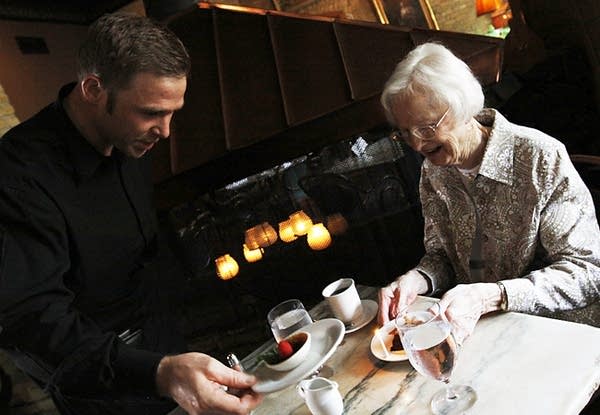Servers, wait staff unlikely to make $100,000
Go Deeper.
Create an account or log in to save stories.
Like this?
Thanks for liking this story! We have added it to a list of your favorite stories.

Republican gubernatorial candidate Tom Emmer's recent comments about restaurant staff salaries have been causing a stir.
Emmer said Monday that some servers might make as much as $100,000 a year, but whether or not they agree with Emmer's views on the minimum wage, many say that a $100,000 server salary is extremely uncommon in Minnesota.
At a campaign stop Monday at the Eagle Street Grille in St. Paul, Emmer called for reducing the state's minimum wage for waiters and waitresses. Instead, he'd like to see a tip credit for employers, so they don't have to pay wait staff so much.
A tip credit would allow employers to drop the minimum wage of tipped employees to $2.13 an hour, the minimum set by federal law. Under current state law, small employers in Minnesota pay workers about $3 more per hour, and large employers pay $4-5 more.
Turn Up Your Support
MPR News helps you turn down the noise and build shared understanding. Turn up your support for this public resource and keep trusted journalism accessible to all.
Emmer said the full minimum wage is not necessary when some servers at the Eagle Street Grille are pulling in $100,000 a year. One of the owners of the restaurant later told MPR News that a few employees there earn that much.
For many, it's hard to imagine that the person waiting on your table is that well paid.
"Statewide, the current estimate of the median wage for wait staff is $9.36 an hour," says state labor market analyst Steve Hine with the Minnesota Department of Employment and Economic Development. That translates into about $19,500 a year for full-time workers.
The wage is higher in the Twin Cities, but not by much. The median hourly wage in Minneapolis and St. Paul would translate to roughly $22,000.
That means half of the roughly 29,000 Twin Cities servers make less, half make more. Could they make a lot more? It's possible, but Hine says the numbers do not suggest that many servers pull in extremely high wages.
Hine says only 10 percent of the state's servers earn more than $17.64 an hour or $37,000 a year.
"So 4,500 of them earn more than that. So that gives you a measure of the top end of the wage distribution," he says.

Robert Crew, the general manager at W.A. Frost in St. Paul, which offers mid- to high-end dining options, said $60,000 a year is likely to be the high-end at his restaurant.
While Robert Crew's take on how much a server can earn differs from Emmer's, Crew does agree with some of Emmer's objections to the minimum wage given to wait staff.
Crew said he doesn't think servers' base wage should be as high as it currently is, even if tips are inconsistent in the bad economy.
"Part of the deal of making gratuities, is you're relying on certain nights to be busier than other nights. That's just the nature of it," he says. "That's just like saying commissioned sales reps in any business out there, when there are slow times of the year, they should get a higher pay. I don't buy into that."
Crew says servers should get some base pay for all the work they do that doesn't earn them tips, like prepping and cleaning up, but he thinks if employers didn't have to pay servers so much, they could pay other restaurant staff more.
But Craig Coulter, a server, bartender and part-time manager at W.A. Frost, said he would hate to see his minimum wage drop. Coulter says he can't imagine servers pulling in the $100,000 Emmer talked about. Coulter says he makes about half that much with tips, and then spends a lot of his income on health care.
"We are not offered health care, so money comes out of my own pocket, and it's pretty expensive," he says. "It can be anywhere from $300-$400 a month."
Across the river at Café Maude in Minneapolis, owner Kevin Sheehy is sympathetic to servers' situations. Sheehy says lowering the minimum wage for tipped workers would help his bottom line, but he's not in favor of paying wait staff less, especially given their overall career trajectories.
"Servers, it's a dead end. There's no upward mobility," Sheehy says. "Perhaps they could get a job at La Belle Vie, or a top end restaurant, but there's nowhere else to go."
Nowhere, that is, unless a server wanted to open his or her own restaurant. Anyone making more than $50,000 per year in tips would undoubtedly know a thing or two about customer service and how to sell lots of food and drinks.




